When I flew down to Tennessee in early March, I had no intention of staying longer than one week. The plane ticket was one-way because I wasn’t certain of my return date, but the rental car and hotel room were both reserved for one week with no penalty for early return/checkout.
Two suitcases contained my clothes and toiletries (checked bag) and my medications and laptop (carried on.) Yes, my medications require their own bag. As a heart transplant recipient, I take two dozen pills every day. My purple bag held a pill organizer with one week of meds and bottles with enough to refill a second week if necessary. It turns out I needed all the pills I packed.
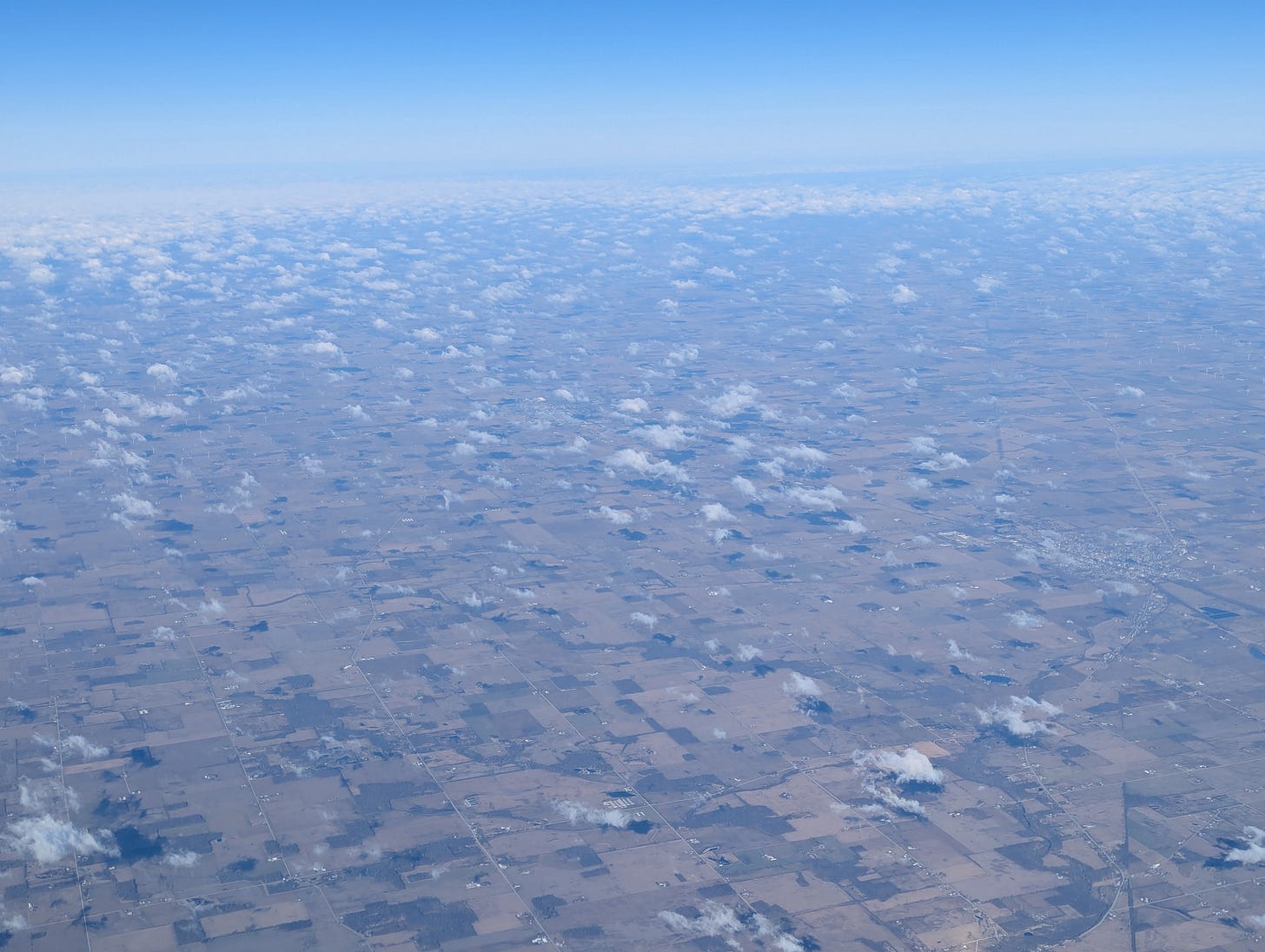
My mission when I flew into the Nashville airport on Saturday morning was simple. I came to advocate for my father who was hospitalized in a regional medical center an hour away from his home. There was no one else who could be with him due to their own health issues and work schedules, and he couldn’t understand what the doctors were telling him.
Over the past two years, he bounced around various hospital emergency rooms in the area, at the mercy of whichever hospital the ambulance was directed. Usually, he found himself in small, rural hospitals without sophisticated diagnostic equipment. The staff did their best with what they had, usually diagnosing him with pneumonia based on chest x-rays and sending him back home with antibiotics. But it seemed strange that he had pneumonia for almost two solid years.
This time I was determined to convince a doctor to perform more in-depth tests. At a larger hospital, they had the equipment to chase down a diagnosis. Unfortunately, that diagnosis turned out to be far more serious than pneumonia. Scans showed multiple masses in multiple locations.
When I set out on my journey, I had a well-thought-out plan on how to manage his needs while still maintaining my own complex issues due to my transplanted heart. My first hurdle was to manage my medication schedule. I take most of my medication at lunchtime and at bedtime. The anti-rejection drugs I take at those two times make me groggy, and I need to take a nap. I refer to it as my “three-martini lunch.” The lunch part of this equation is very important. If I don’t eat a sufficient quantity of food when I take my medication, I can end up feeling terrible.
This medication schedule had to be included in my travel plans. I scheduled the earliest morning flight to Nashville so I could rent a car and drive an hour and a half from the airport to the hospital and arrive by lunchtime so I could take my meds after my arrival. Lunch came courtesy of a Burger King Whopper Junior wolfed down in the car in the parking lot before I gulped down my pills and ran inside.
The Holiday Inn Express sat eight minutes from the hospital and provided the necessary amenities. Every morning the breakfast bar opened at 6:00, and the exercise room was open 24 hours. I harbored visions of a morning workout followed by a hot breakfast. Since I traveled from Eastern Time to Central Time, my usual 6:00 wakeup would become 5:00, giving me plenty of time to get a jump on the day. The room was better than I imagined – a king-sized bed, a desk where I could sit and write, and a chaise lounge in the corner which beckoned for me to read a book and sip a cup of tea.
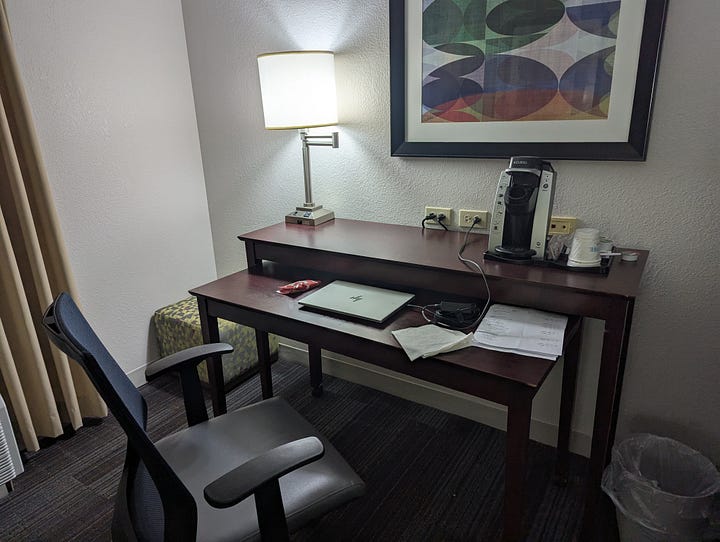
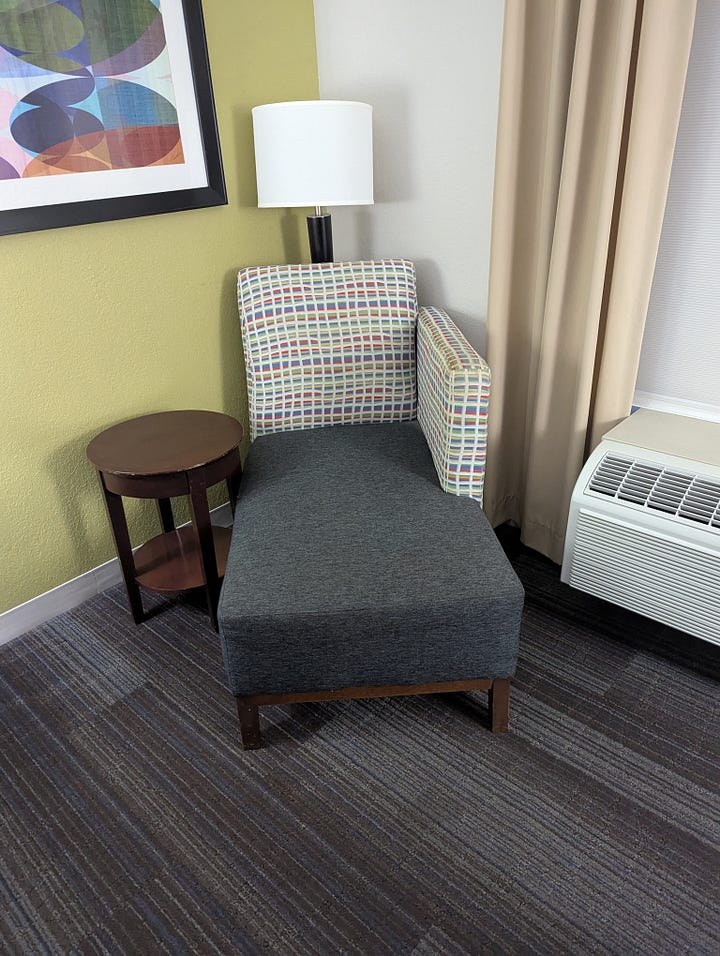
The best laid plans of mice and men are apt to get royally effed up. My first morning there was the day we “spring forward” for daylight savings. I continued to get up at my usual time, which was still 6:00. He wanted me to bring him breakfast of pecan pancakes from Cracker Barrel, and I discovered a Smoothie King nearby. My mornings took on a new plan. At home, I usually start my day with a smoothie from my Nutribullet with a scoop of protein powder and chia seeds. My new routine began with a pineapple and kale smoothie with added protein, grabbed enroute to the hospital.
His hospital room had a vinyl sofa/cot next to his bed, so at lunchtime I zipped down to the hospital cafeteria for a bowl of vegetable soup or a spinach wrap stuffed with grilled chicken and assorted vegetables – a healthy lunch to balance out my meds. After eating, I stretched out on the sofa for a nap, listening to a podcast on my headphones while he slept. With this routine, I kept my meds, my meals, and my blood sugar in balance.
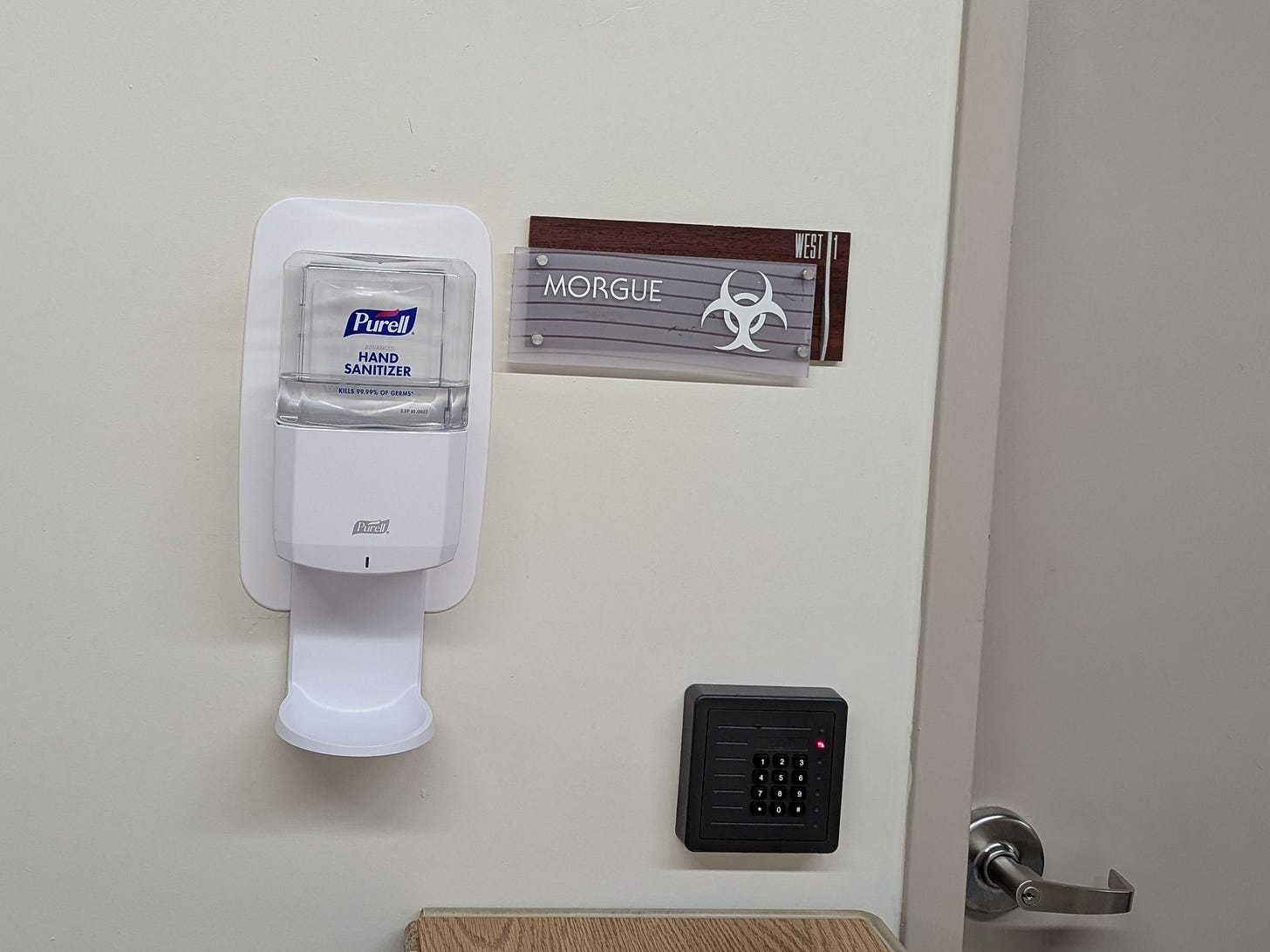
Because I left the hotel before 7:00 every morning to get my smoothie, his breakfast, and get to the hospital during shift change, I never did get an early morning workout. Likewise, I remained in his room all day to be able to speak with any doctors who rounded as well as other medical staff involved in his care. Most nights, I left after 7:00, having greeted the night shift. This allowed me to develop a relationship with those providing his care and find out things I might otherwise not have known.
Once I left the hospital, I played the game of “where can I find something healthy for dinner?” Some nights I fared better than others. Most nights I brought my food back to the hotel and, dressed in my pajamas, ate at the desk where I thought I would write. That chaise lounge never made contact with my derriere, let alone cradled me while I read and sipped tea. I managed to skim a couple chapters of a book in bed but fell asleep before I got very far.

Despite the desperate lack of “me time,” I did fairly well with self-care during that week. I took all my pills on time, with food, and swallowed all of my supplements – potassium, magnesium, iron, calcium, and fish oil. Little did I know that all sense of routine was about to go out the window.
Six days after I arrived, he was released from the hospital to go home on hospice care. I managed to delay his discharge until mid-afternoon because I cannot drive during the time that my meds make me drowsy. My driving skills would surely be impaired.
Ambulance transport drove him home at 3:00 while I followed in my rental car, making a couple stops along the way. I reached his house by 5:00. The hospice nurse was already there to conduct his intake. This appointment lasted nearly two hours, but it was essential. After she left around 7:00, my father was grumpy and just wanted to sleep. My stepbrother and I set up the rollaway cot and got him settled into bed a little bit after 8:00.
By the time I settled down at the cabin I rented, it was nearly 9:00. I ate a little bit, took my bedtime meds, and hit the sack without taking any of the supplements I usually consume during the afternoon/evening period.
That night, a monster of a weather system passed through, causing me to have one of the worst fibromyalgia flares I’ve had in a long time. The next morning, I hobbled around as I cleaned up my father and got him settled for the day. Later, I ran into the nearest town for some supplies, loving every second of the heated seat in the car. That impulse upgrade at the rental desk was a life saver. I took every opportunity to run errands just so I could bake my lower back in the electric heat.
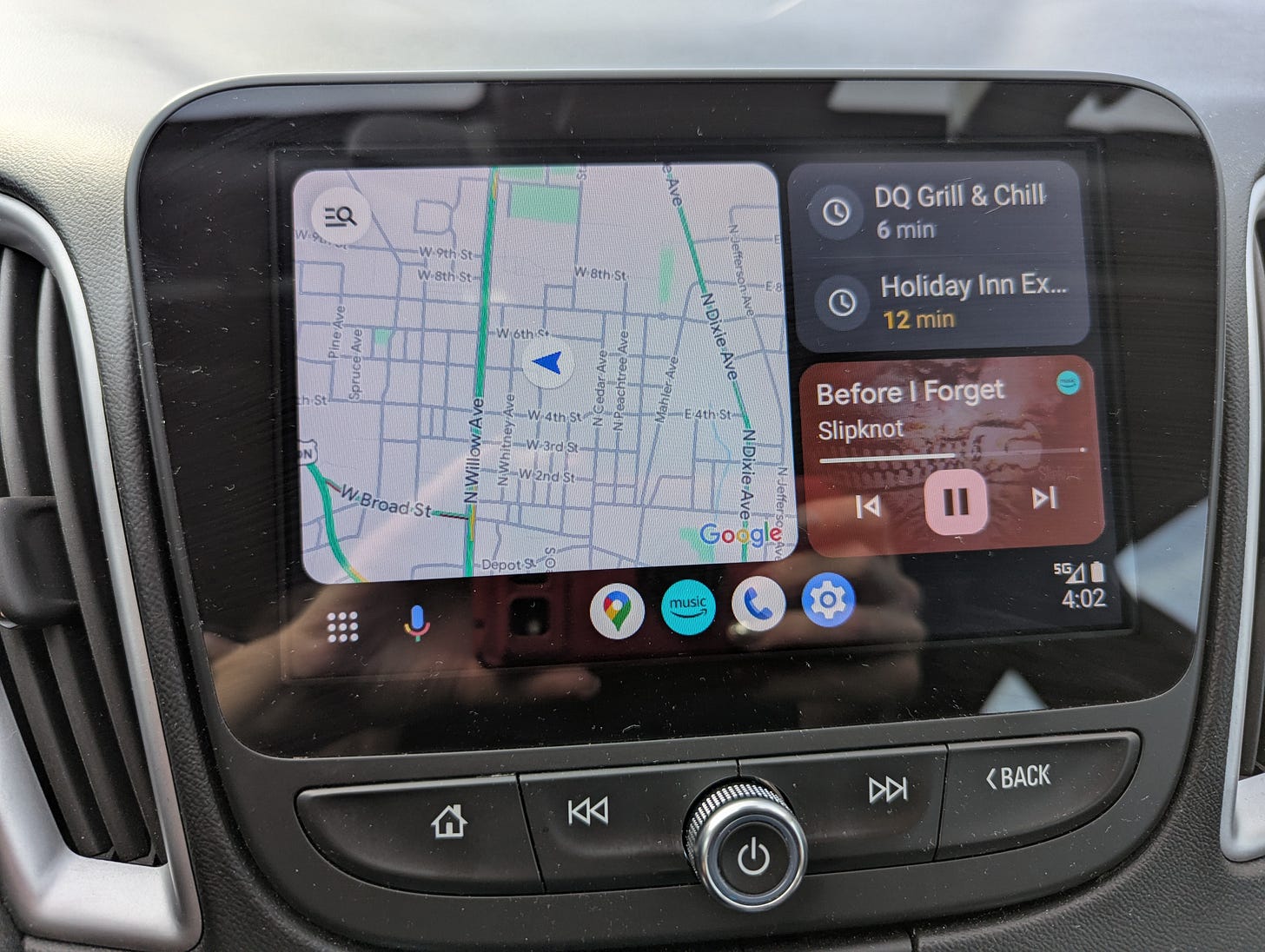
The week I spent at his house turned into a blur of cleaning, caregiving, and coordinating. I’m sure my presence would have been beneficial beyond that week, but I was running out of anti-rejection medication. I only brought two weeks of pills with me because I only expected to stay for one week. When I looked at my pill organizer, I noted that the lunch and bedtime slots were empty, but I had not been as diligent at taking my supplements. Most of my morning and evening slots still had pills rattling around inside.
Although I made sure to take my lunchtime meds when my phone alarm sounded, I wasn’t always in a situation where I could eat right away. A couple times, I took my pills and couldn’t eat for more than an hour afterward. Both times, I became very sick and had to escape to the cabin to ride out the bed spins, chills, and nausea that inevitably followed.
When I return to Tennessee to resume his care next week, I’m going to lay out a better schedule for my own self-care. I plan to bring my Nutribullet and protein powder, and stock the freezer at the cabin with smoothie ingredients and some Healthy Choice power bowls for a quick microwave lunch. This will require me to drive one hour each way to shop at the closest Publix because those groceries aren’t sold locally.

Just like the flight attendants tell you before takeoff, make sure your oxygen mask is on and working before helping others. I need to make sure I’m taking care of myself or I won’t be of any use to my father.




This. So much about caregiving and self-care and my future if this transplant takes place for my husband. I took today to rest at the hospitality house where I am staying because I needed some oxygen before the next two days of consults. Thank you for sharing and helping me see that what looks impossible is complicated but doable. I had no idea how much I needed your words when I first found you. Or you found me? No matter. It is a good thing! :-)
I would title this, What love does....